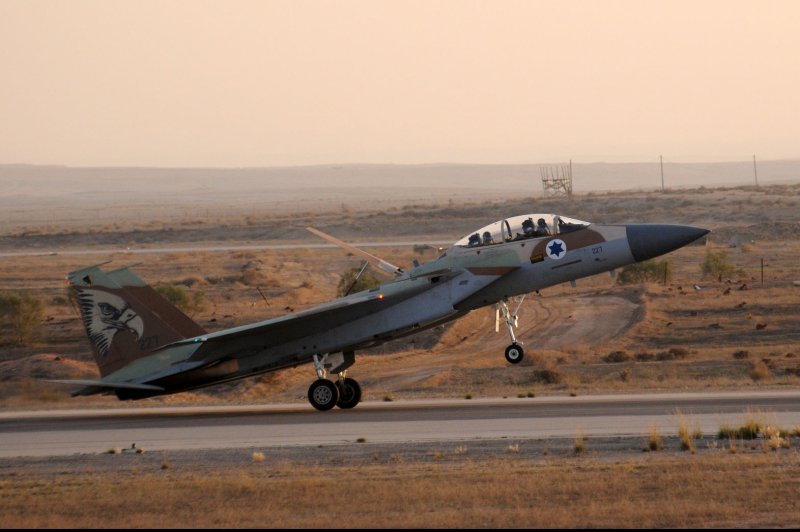An Israeli Air Force fighter jet lands at Hatzerim Air Base near Beersheva, Israel. For the first time, Tel Aviv said Wednesday it was behind a 2007 strike on a Syrian nuclear facility -- a disclosure intended to demonstrate that it will act militarily if Iran obtains nuclear weapons. File Photo by Debbie Hill/UPI |
License Photo
March 21 (UPI) -- For the first time, the Israeli government said Wednesday it was behind a 2007 bombing of a Syrian nuclear facility -- a disclosure intended to send a message that it won't accept a nuclear Iran.
Israeli intelligence minister Yisrael Katz directly warned Tehran that Israel would not allow it to develop and possess nuclear weapons.
"The courageous decision of the Israeli government almost 11 years ago to destroy the nuclear reactor in Syria and the successful operation following it sends a clear message: Israel will never allow nuclear weapons to countries like Iran who threaten its existence," Katz tweeted Wednesday.
Newly released reports show that Israel sent four F-16 fighters into Syria on Sept. 6, 2007, to to bomb the partially completed al-Kubar nuclear reactor in Deir al-Zor after monitoring the site for years.
"Syria has set up, within its territory, a nuclear reactor for the production of plutonium, through North Korea, which according to an (initial) worst-case assessment is liable to be activated in approximately another year," a report dated March 30, 2007, said.
After the raid was completed, the Israeli military reported the reactor "had been totally disabled" and the damage "was irreversible."
Israeli Defense Minister Avigdor Lieberman said Wednesday the reactor attack proved Israel is willing to strike militarily, if necessary.
"The motivation of our enemies has grown in recent years, but so too the might of the Israel Defense Forces," Lieberman said. "Everyone in the Middle East would do well to internalize this equation."
The decision to go public with the raid followed recent calls by Israeli Prime Minister Benjamin Netanyahu for the United States and the international community to dispose of the 2015 Iran nuclear deal.
Earlier this month, Netanyahu met with U.S. President Donald Trump during a visit to the United States and said they would "discuss Iranian aggression" and Tehran's nuclear program.
Although Netnayahu and Trump have each condemned the Obama-era deal, formally called the Joint Comprehensive Plan of Action, the United Nations Atomic Agency has certified that Iran is continuing to comply with the terms of the deal.
Federica Mogherini, the European Union's top diplomat, has defended the agreement -- saying the JCPOA "made the world safer and prevented a potential nuclear arms race in the region."
France, Britain, China, Russia, Germany and the United States played leading roles in finalizing the landmark deal with Tehran in July 2015, which shuttered Iran's military nuclear program in exchange for the West thawing frozen Iranian assets.
"I don't think that anybody has produced a better alternative to the JCPOA as a way of preventing the Iranians from going ahead with the acquisition of a military nuclear capability," British Foreign Seretary Boris Johnson said in January.















